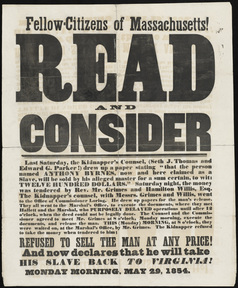| This past fall I participated in Amazing Grace: How Writers Helped End Slavery, a masters level course offered by the Gilder-Lehrman Institute of American History. The course, led by Columbia Professor, and GLI President, James Basker, examined the role of abolitionist writers in the 19th century struggle to end that "peculiar institution." The final project was to compile our own abolitionist writing anthology that could be used in the classroom. I wanted to share the work I generated during this course as perhaps the primary sources I chose could prove useful in your own classrooms. In this blog "mini-series" (Amazing Grace) I will share with you my reflections, my anthology introductions, and the sources themselves. Most, if not all, of the sources I reference can be found in James Basker's book American Antislavery Writings: Colonial Beginnings to Emancipation. |
The Culminating Project:
A New Abolitionist Anthology
A New Abolitionist Anthology
Reflection:
In my seventh grade United States History course we take an entire trimester to investigate slavery in the 19th century. We examine the conditions of chattel slavery, the works of abolitionists, the era of failed compromises, the Civil War, and the Reconstruction Era utilizing only primary source materials. In creating my abolitionism anthology, I intend to create a supplementary workbook for my students to guide them in researching and discussing the evolution of abolitionist writings. In particular, I wish my collection to track the varied justifications and arguments presented by 19th century writers to push the issue of abolitionism to the forefront in the 19th century.
The collection will culminate with excerpts from the Emancipation Proclamation, Lincoln’s second inaugural address, and the text of the thirteenth amendment. Students will then discuss and debate the essential question of whether or not Lincoln deserves the moniker, the Great Emancipator. Students will also identify the argument or justification from the anthology that they feel best exemplifies the abolitionist spirit – in that it is the most persuasive.
In my seventh grade United States History course we take an entire trimester to investigate slavery in the 19th century. We examine the conditions of chattel slavery, the works of abolitionists, the era of failed compromises, the Civil War, and the Reconstruction Era utilizing only primary source materials. In creating my abolitionism anthology, I intend to create a supplementary workbook for my students to guide them in researching and discussing the evolution of abolitionist writings. In particular, I wish my collection to track the varied justifications and arguments presented by 19th century writers to push the issue of abolitionism to the forefront in the 19th century.
The collection will culminate with excerpts from the Emancipation Proclamation, Lincoln’s second inaugural address, and the text of the thirteenth amendment. Students will then discuss and debate the essential question of whether or not Lincoln deserves the moniker, the Great Emancipator. Students will also identify the argument or justification from the anthology that they feel best exemplifies the abolitionist spirit – in that it is the most persuasive.
This anthology, tentatively titled Abolitionist Persuasion: The Varied Lenses of 19th Century Abolitionist Writings, will serve to present my students with varied causes and perspectives from the abolitionist movement. In addition to reading and summarizing each excerpted text in their own words, the students will identify themes for each passage (religious persuasion, Constitutional persuasion, spirit of the Revolution persuasion, and the cause for human rights) and attempt to use historical context to understand why each writer chose their approach to writing.
Below you can find a link to download the anthology I created during the course. I intend to use it as a supplement to my class's textbook. I encourage you to download, peruse, and use as you see fit. I would welcome any critical feedback and/or suggestions to the work. I am also curious about what texts you would add to the anthology if you could.
Lastly, the name is terrible! Any suggestions for a more clear and concise title for this anthology.
Below you can find a link to download the anthology I created during the course. I intend to use it as a supplement to my class's textbook. I encourage you to download, peruse, and use as you see fit. I would welcome any critical feedback and/or suggestions to the work. I am also curious about what texts you would add to the anthology if you could.
Lastly, the name is terrible! Any suggestions for a more clear and concise title for this anthology.
| Abolitionist Anthology |



 RSS Feed
RSS Feed

